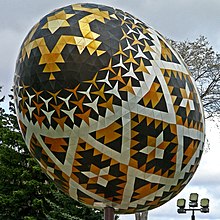Ron Resch
Appearance
(Redirected from Ronald Resch)
Ron Resch | |
|---|---|
 Vegreville egg | |
| Born | Ronald Dale Resch 1939 |
| Died | November 24, 2009 (aged 70) |
Ron Resch (Ronald Dale Resch) was an artist, computer scientist, and applied geometrist, known for his work involving folding paper, origami tessellations and 3D polyhedrons.[1][2][3][4] [5][6][7]
Resch studied art at the University of Iowa receiving his Master of Fine Arts. Subsequently, he was a professor of architecture at the University of Illinois at Urbana-Champaign where he was affiliated with the Coordinated Science Laboratory. He went on to become a professor of computer science at the University of Utah.[8]
He famously designed the Vegreville egg, the first physical structure designed entirely with computer-aided geometric modeling software.
References
[edit]- ^ Schmidt, Petra; Stattmann, Nicola (5 November 2012). Unfolded: Paper in Design, Art, Architecture and Industry. Walter de Gruyter. ISBN 9783034609050. Retrieved 13 November 2013.
- ^ Dennis, Lynnclaire; McNair, Jytte Brender; Kauffman, Louis H. (21 May 2013). The Mereon Matrix: Unity, Perspective and Paradox. Newnes. ISBN 9780124046887. Retrieved 13 November 2013.
- ^ Kappraff, Jay (2001). Connections: The Geometric Bridge Between Art and Science. World Scientific. ISBN 9789812811394.
- ^ Frederickson, Greg N. (26 August 2002). Hinged Dissections: Swinging and Twisting. Cambridge University Press. ISBN 9780521811927.
- ^ Wang-Iverson, Patsy; Lang, Robert J. (21 June 2011). Origami 5: Fifth International Meeting of Origami Science, Mathematics, and. CRC Press. ISBN 9781568817149.
- ^ Davis, Philip; Hersh, Reuben; Marchisotto, Elena Anne (27 October 2011). The Mathematical Experience, Study Edition. Springer. ISBN 9780817682941.
- ^ Richard Rhoad; George Milauskas & Robert Whipple (1991). "7 - Polygons: Regular Polygons". Geometry: for Enjoyment and Challenge (new ed.). Mc Dougal Littell/Houghton Mifflin. pp. 318. ISBN 978-0-86609-965-3.
- ^ Studio Potter. Daniel Clark Foundation. 1981. Retrieved 13 November 2013.
External links
[edit]- The Ron Resch Paper and Stick Film
- Ron Resch Official Web Site (restored recently)
- Some of Resch's works
